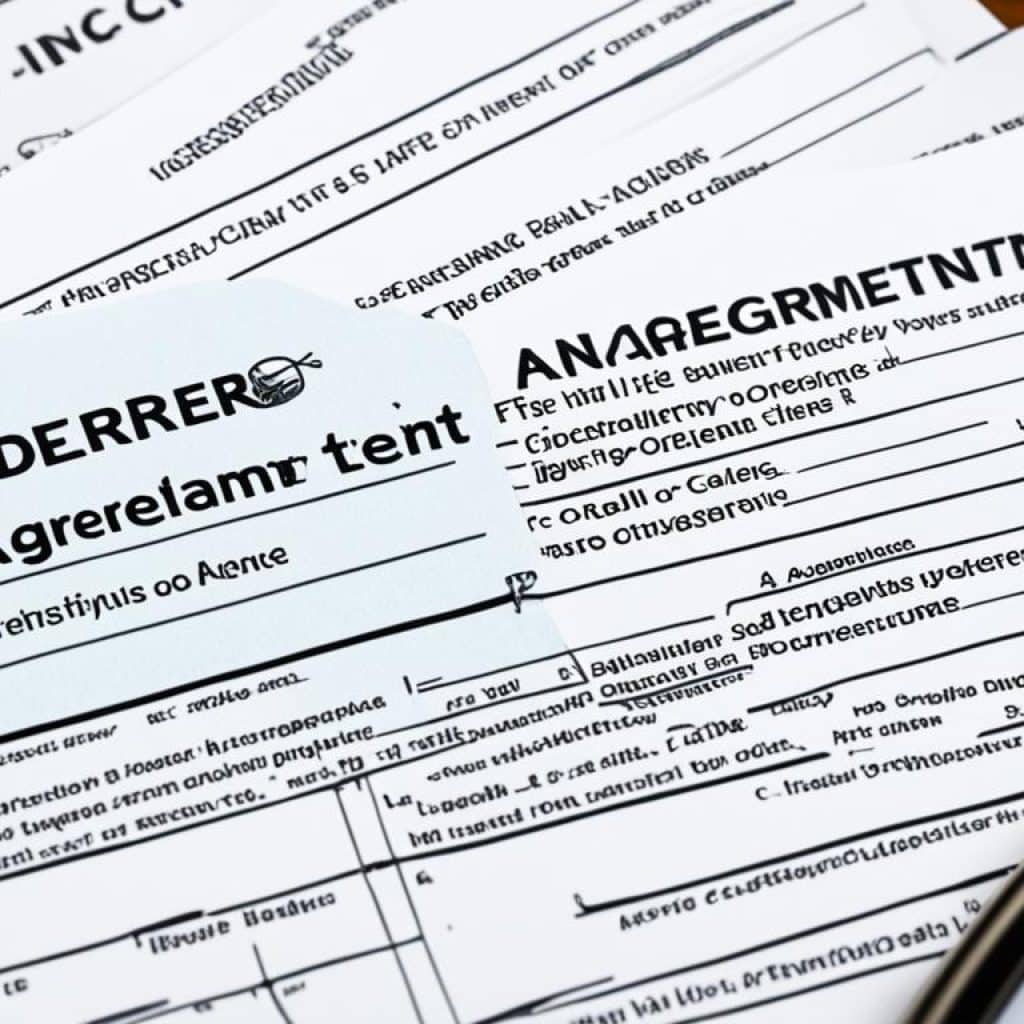Divorce can be tough and emotional, affecting many areas of your life. It’s important to know how it changes your life insurance policy and who gets the benefits1. It’s key to understand the rules about life insurance after a divorce to keep your wishes safe and secure.
Your life insurance policy is a key part of your financial plan. It shows who you want to protect the most. After a divorce, the people you named as beneficiaries might not be the same anymore2. You’ll need to know the laws and talk to your lawyers to sort it out.
Key Takeaways
- Divorce can change who gets your life insurance money.
- Life insurance with cash value might be seen as shared property, but term insurance is usually yours alone.
- A judge might order you to keep a life insurance policy with your ex-spouse if you owe them money for support.
- Talking to legal experts is key to figuring out life insurance rules after a divorce.
- Planning carefully and knowing the law helps make sure your life insurance fits your new financial situation and wishes.
Understanding life insurance rules after a divorce lets you control your money and protect your loved ones3. Stay alert, get expert advice, and make smart choices to keep your life insurance working for you, no matter what happens.
Understanding Life Insurance After a Divorce
Dealing with life insurance during and after a divorce can be tricky. The kind of policy you have and your state’s laws matter a lot. Knowing what affects life insurance policies can help you make smart choices. This ensures your coverage fits your needs after the divorce.4
Factors Affecting Life Insurance Policies
The kind of life insurance you have is key in divorce situations. Term life insurance is usually seen as your own asset, but permanent life insurance with cash value might be seen as something shared with your ex.5 Your divorce agreement might also set rules, like keeping an ex-spouse as a beneficiary or getting a new policy for support5.
Just because you get a divorce, it doesn’t mean your ex will automatically lose their spot as your policy’s beneficiary. Usually, they stay the named beneficiary unless you change it yourself.5 You can take your ex off as a beneficiary if you owe them alimony or child support5.
Term vs. Permanent Life Insurance
What kind of life insurance you have also matters after a divorce. Term life insurance is usually yours alone, but permanent life insurance with cash value might be seen as shared property during divorce.5 Permanent policies, like whole or universal life, grow in value over time. This value could be seen as shared during divorce.6
It’s key to check your life insurance and who you’ve named as a beneficiary after a divorce. Talking to a financial advisor or lawyer can guide you through these tricky issues. They can help you make the best choices for your life insurance.
“It’s important to understand the different factors that can affect your life insurance policy during and after a divorce.”
Life Insurance Beneficiary Rules After Divorce
Dealing with life insurance during and after a divorce can be tough. It’s key to know the laws and rules. Your divorce agreement might say you must keep your ex-spouse on your life insurance policy or buy a new one for their support7. If you pay alimony or child support, the court might make sure your ex is still a policy beneficiary to protect them if something happens to you7.
Divorce Decree Stipulations
In the U.S., some states automatically take an ex-spouse off a life insurance policy after a divorce7. This is true in places like Alabama, Alaska, Arizona, and others7. But, group life insurance through work is different because of the Federal ERISA law7. ERISA rules say you can’t change your policy’s beneficiaries just because you got divorced7. Also, even after a divorce, your ex might still be the policy’s beneficiary unless you update it7.
Alimony and Child Support Considerations
In some states, all money earned during a marriage is shared property7. So, your ex could get a part of your life insurance money if you paid premiums together7. There are also rules for changing an ex-spouse’s status on a life insurance policy after a divorce, especially if a court orders it7.
Make sure to look over your divorce agreement carefully to understand the rules about life insurance8. Talking to a lawyer can also help make sure you follow the law and protect your family’s money7.
Updating Life Insurance Beneficiaries
After a divorce, it’s key to check and update your life insurance policy’s beneficiaries9. Many states have laws that remove an ex-spouse as a beneficiary when you divorce9. But, some legal issues can affect how life insurance pays out, like being in a community property state or not updating the beneficiary after divorce in a state with revocation-upon-divorce laws9.
Removing an Ex-Spouse as Beneficiary
Can you take your ex-spouse off your life insurance policy? It depends on your divorce agreement9. If you don’t have to pay alimony or child support, you might be able to do so10. But, if the court says you must keep your ex-spouse as a beneficiary, you can’t change it without their okay or a court order9.
In some states like Alabama, Arizona, Florida, New York, Texas, and others, an ex-spouse is automatically taken off as a life insurance beneficiary after divorce9. But, under federal ERISA law, group life insurance policies keep an ex-spouse as a beneficiary unless the policyholder changes it9.
Some states let you put your ex-spouse back as a life insurance beneficiary after divorce, especially if it’s about child or spousal support9. In community property states, an ex-spouse could get part of the life insurance money if premiums came from community property income9.
It’s vital to look at your divorce agreement and talk to a lawyer or your life insurance company to know your rights and duties about updating beneficiaries after a divorce10. Not updating your beneficiaries can lead to legal fights and the court deciding who gets the insurance money10.
The person with the policy can change who gets the money, making sure it goes to the right people10. But, in community property states or with irrevocable beneficiaries, you might need more steps or approvals10.
Naming Children as Beneficiaries
After a divorce, you might think about naming your kids as your life insurance policy’s beneficiaries. But, it’s key to know the legal stuff around this choice11. Minors can be named as beneficiaries, but they can’t get the life insurance money directly in most places12. To keep your kids safe, think about naming a guardian or making a trust to handle the money until they grow up. Most states say kids can manage money at 18, but it varies12.
Choosing a guardian or a trust makes getting the money easier and makes sure it’s used for your kids’ needs12. An Irrevocable Life Insurance Trust (ILIT) is also a smart move. It lets the trust own the policy and name your kids as the ones who get the money, making sure it’s given out right12.
Check your divorce papers because they might change who you can name as a beneficiary or make you pick your ex or kids as permanent ones11. Keeping your life insurance policy updated and changing beneficiaries quickly can prevent fights or delays in getting the money13.
Knowing the rules about life insurance and acting to protect your kids’s money means your family will be taken care of if something happens to you11. This gives you peace of mind and keeps your family safe during tough times13.
“Proper beneficiary planning is essential to ensure your life insurance policy aligns with your wishes and your family’s best interests, especially after a divorce.”
Keeping Life Insurance After Divorce
Even after a divorce, keeping life insurance is crucial. It ensures your family’s financial safety if you pass away unexpectedly14. You can also change your beneficiaries as your life changes. And, if you have a permanent policy, you can keep adding cash value15.
Financial Security for Family
If you get alimony or child support, life insurance can help your family if your ex-spouse dies. This ensures your kids are taken care of14. The court might make you keep a life insurance policy after divorce, based on your agreement and financial duties14.
Flexibility to Update Beneficiaries
You can usually change who gets your life insurance money, but some options can’t be changed easily14. After a divorce, make sure your insurance info is up to date and your beneficiaries are correct. This ensures you have the right coverage for your needs14.
Building Cash Value
Some life insurance policies grow in value over time, which can be split in a divorce14. These policies are seen as joint property in divorce cases. They are treated differently than term policies, with the cash value being seen as shared15.
“Life insurance is not always required or included in a divorce settlement but can play a vital role in post-divorce financial security, especially in cases involving children.”14
Thinking about keeping life insurance after a divorce is smart. It helps protect your family’s finances, lets you change who gets the money, and keeps adding cash value for later.
Life Insurance as a Marital Asset
Going through a divorce means understanding life insurance as a marital asset. The type of policy you have can affect how it’s divided during the divorce16. Permanent policies like whole or universal life have cash value, seen as part of the marital estate. Term life insurance, however, doesn’t build cash value and is usually seen as separate17.
Some divorce decrees might say the paying spouse must keep a life insurance policy. This is especially true if payments are for alimony or child support and continue after the payer dies16. This ensures the financial duties are covered even if the payer passes away18.
It’s also key to update your life insurance beneficiaries after a divorce. This change in status means your assets go where you want them to17. Not updating can cause problems if your ex is still listed as a beneficiary, leading to disputes16.
Talking to your divorce lawyer about your life insurance is a good idea. They can help divide assets fairly and explain your rights and duties16. Laws on life insurance and divorce vary by state, so knowing the laws in your area is crucial17.
In summary, life insurance is a big part of marital assets and how it’s handled in a divorce matters a lot financially. Knowing the rules about life insurance and divorce helps you make smart choices. This way, you can protect your interests and move forward smoothly161817.
life insurance beneficiary rules after divorce
After a divorce, dealing with life insurance beneficiary rules can be tricky. Laws on who gets the insurance money vary by state. It’s key to know your state’s rules to make sure your wishes are followed. In 26 states, a divorce automatically removes a former spouse as a78. But in 24 states, the old beneficiary status19, unless there’s a federal rule about pension plans.
Even if a divorce usually takes away a former spouse’s beneficiary rights, some exceptions can apply. Some couples don’t update their beneficiaries because they forget, not because they don’t want19. The case of Sveen v. Melin (2018) showed how a divorce can lead to fights over insurance money between the ex-spouse and kids19. Sometimes, people might want their exes to still have financial rights, like in shared custody situations or if the divorce was friendly19.
If you’re getting a divorce, check your life insurance policy and learn about your state’s laws. Work with your divorce lawyer to protect your interests and make sure your life insurance goes where you want it to. Some divorce decrees can change who gets the insurance money, like in community property states or if a court says so7. Being informed and taking action can help you handle life insurance after a divorce.
“The Supreme Court’s 2018 8-1 majority opinion highlighted that most divorcees do not wish to enrich their former partners.”
Updating Life Insurance Beneficiaries
After a divorce, it’s key to update your life insurance to match your new wishes. Some states let an ex-spouse be named as a beneficiary after divorce7. But, fighting over life insurance after a divorce is hard and you’ll likely need a lawyer7.
Keeping your life insurance up-to-date is crucial to make sure your money goes where you want it to, even if you die suddenly. By being proactive and working with your insurance and legal team, you can handle life insurance after a divorce. This way, you can make sure your loved ones are taken care of1978.
Divorce Decree and Beneficiary Changes
Going through a divorce means you need to know how it affects your life insurance20. Even if your ex is listed as the policy’s beneficiary, the divorce decree might change this20. It might mean you need to update the beneficiary to someone like your kids20. It’s key to check your divorce decree and update your policy to match your wishes20.
In places like New York, there are laws that protect spouses regarding life insurance20. For example, N.Y. Ins. Law § 3205 (c) (1) lets a spouse insure the other20. But, the divorce court can still change the rules for life insurance policies20.
In states like Idaho, divorce can automatically remove an ex from wills and powers of attorney21. But, life insurance payouts go to the named beneficiary, not the will21.
In Pennsylvania, divorce decrees must remind people to update life insurance and other arrangements22. This helps avoid disputes later22.
No matter where you live, it’s important to check and update your life insurance after a divorce20. Not doing so could mean your ex gets the money, not you21.

Knowing how your divorce affects your life insurance and updating your policy is key202122. This way, your loved ones are safe, and your wishes are followed202122.
Court-Ordered Life Insurance
After a divorce, the court might tell you to keep a life insurance policy with your ex-spouse as the beneficiary23. This is often needed if you have to pay alimony or child support. The goal is to make sure your ex-spouse is taken care of if you pass away1. It’s important to follow the court’s orders and get the policy on time.
In some places, laws say insurers can’t pay out to an ex-spouse unless the divorce decree says so23. Also, life insurance with cash value, like whole or universal life, might be seen as shared property during a divorce23. But term life insurance, without cash value, is usually seen as your own23.
Courts might order you to buy life insurance to help pay for child support if you die23. Not following these orders could lead to legal trouble23. If you’re unsure about court-ordered life insurance, it’s best to talk to a lawyer.
Keeping up with court-ordered life insurance is key to meeting your financial duties and looking out for your ex-spouse and kids after a divorce2312.
“Court-ordered life insurance is a critical safeguard to ensure your ex-spouse’s and children’s financial security in the event of your passing.”
Life Insurance for Ex-Spouse Financial Support
If your divorce decree says you must pay financial support to your ex-spouse, like alimony or child support, the court might tell you to keep a life insurance policy with your ex-spouse as the beneficiary24. This makes sure your ex-spouse and any kids keep getting the support they need if you die suddenly.
The cost of insuring an ex-spouse changes based on the type of insurance, coverage, their health, age, and lifestyle25. Some insurers might ask your ex-spouse to have a health check before giving the policy, which could change the cost and coverage25. There are no-exam life insurance options, but they’re pricier and might have limits25.
When getting life insurance on an ex-spouse, you must show you have an insurable interest and get their okay25. The ex-spouse needs to help with the application, giving health info, family medical history, and ID details25. Problems can happen if you can’t prove you have an insurable interest or if your ex-spouse won’t agree to the policy25.
Court orders might make one spouse keep a policy with the ex-spouse as the beneficiary during and after divorce to cover alimony and child support if they die25. Changing life insurance beneficiaries is usually easy, with insurers giving a form for updates26.
After divorce, joint life insurance might not work for shared mortgages, so you’ll need to look into new insurance options26. Individual policies let you change beneficiaries easily, which is important after a divorce to make sure the right person gets the money26.
Tell your life insurance company about big life changes like divorce to keep your policy valid, especially for joint policies where changes can affect coverage26. Life insurance can be part of divorce settlements, depending on if it’s individual or joint policies and who gets the payout26.
“Overlooking cash value in whole or universal life insurance policies is a common issue during divorce asset division.”24
Updating Retirement Accounts and Investment Accounts
After a divorce, it’s key to check and update who gets your retirement and investment accounts. These accounts might still have your ex-spouse listed as the main person to get the money if you don’t change it27.
Rules say that if you’re married, your spouse gets your retirement accounts like 401(k)s and IRAs by default27. If you don’t pick someone else, the law or the plan rules might decide who gets it27. Some states like Arizona, California, and Texas need your spouse to agree in writing for you to change who gets your IRA27.
Make sure your retirement and investment accounts reflect your new wishes. You might need to take your ex-spouse off and add new people like your kids28. Think about using special rules like per stirpes or per capita to give you more control over your money27.
Trusts like QTIP and QDOT can help you keep control of your retirement money after you’re gone27. Being informed and taking action means your money will go where you want it to, matching your new family situation and plans27.
In many places, the Uniform Simultaneous Death Act means if two people die close together, their heirs only go through probate once27. This shows why keeping your account updates current is so important for your estate and your family’s future.
By updating your retirement and investment accounts after a divorce, you make sure your money goes where you want it to. This is a key step in managing your finances after a divorce and should not be missed272829.
Dividing Assets: Agreement vs. Court Order
When dealing with life insurance and other assets in a divorce, you have two choices. You can either agree with your ex or let the court decide30.
Agreeing with your ex lets you both control how to split your assets, including life insurance30. This way, you both have a say in what happens to your shared property30.
If you can’t agree, the court will decide how to split your assets31. They look at things like how long you were married, your ages, health, and your money situation31.
In some places like New Jersey, a life insurance policy with an ex as the beneficiary gets changed after divorce32. But, courts might look at the policy’s original intent32.
Whether you agree or the court decides, make sure your life insurance fits your new financial needs30. This includes alimony, child support, and funeral costs30. Talking to a financial advisor or lawyer can help you make smart choices for your family’s future.

“When it comes to life insurance policies and other assets during a divorce, having a clear understanding of your options and the potential outcomes is essential.”
Conclusion
Dealing with life insurance beneficiary rules after a divorce can be tough and emotional33. It’s important to know how your life insurance policy might change, what the court might say, and your options. This way, you can make choices that protect you and respect your wishes33. Talk to your divorce lawyer and insurance company to check your policy and update it for your new situation.
Changing your ex-spouse beneficiary rights and updating life insurance after divorce can be hard. But, it’s key to keep an eye on your named beneficiary laws and contingent beneficiary guidelines34. This helps keep your family’s finances safe and makes sure your divorce decree impact on beneficiaries is handled right35.
Remember, the rules for life insurance policy changes post-divorce vary by state35. If there’s a beneficiary dispute resolution, knowing your state’s laws on life insurance transfer on divorce is crucial. This way, you can handle life insurance after a divorce with confidence and ease.
FAQ
How can a divorce impact my life insurance policy?
What is the difference between term and permanent life insurance policies when it comes to divorce?
Can my divorce decree require me to maintain my ex-spouse as a beneficiary on my life insurance policy?
Can I remove my ex-spouse as the beneficiary on my life insurance policy after a divorce?
How can I ensure my children are protected as beneficiaries of my life insurance policy?
What are the benefits of maintaining life insurance coverage after a divorce?
How is a life insurance policy treated as a marital asset during a divorce?
How can a divorce decree impact the beneficiary designations on my life insurance policy?
Can the court order me to maintain a life insurance policy with my ex-spouse as the beneficiary?
Why might the court require me to maintain life insurance with my ex-spouse as the beneficiary?
Source Links
- https://www.progressive.com/lifelanes/turning-points/life-insurance-beneficiary-rules-after-divorce/
- https://havenlife.com/blog/life-insurance-beneficiary-rules-after-divorce/
- https://www.investopedia.com/articles/personal-finance/112515/how-life-insurance-works-divorce.asp
- https://www.trustage.com/learn/life-events/divorce-life-insurance
- https://www.aflac.com/resources/life-insurance/life-insurance-beneficiary-rules-after-a-divorce.aspx
- https://www.protective.com/learn/life-insurance-after-divorce
- https://boonswanglaw.com/life-insurance/divorce-overrides-beneficiary/
- https://www.pinneyinsurance.com/life-insurance-beneficiaries-and-revocation-upon-divorce/
- https://www.boonswanglaw.com/life-insurance/divorce-overrides-beneficiary/
- https://www.policygenius.com/life-insurance/can-you-change-your-life-insurance-beneficiary/
- https://www.trustage.com/learn/life-insurance/how-to-name-a-beneficiary
- https://www.policygenius.com/life-insurance/naming-a-child-as-a-life-insurance-beneficiary/
- https://www.securian.com/insights-tools/articles/naming-a-life-insurance-beneficiary.html
- https://www.usaa.com/inet/wc/advice-insurance-life-insurance-after-divorce
- https://www.policygenius.com/life-insurance/life-insurance-and-divorce/
- https://www.forbes.com/advisor/life-insurance/divorce/
- https://www.beermannlaw.com/practice-areas/divorce/life-insurance-in-divorce/
- https://www.quotacy.com/life-insurance-after-a-divorce/
- https://www.apa.org/monitor/2019/01/jn
- https://www.dfs.ny.gov/insurance/ogco2000/rg011061.htm
- https://www.racinelaw.net/life-insurance-and-divorce-the-law-of-unintended-consequences.html
- https://www.pietragallo.com/family-law-blog/divorce-decrees-must-now-reference-termination-of-beneficiary-designations/
- https://www.insurance.com/life-insurance/life-events/custody.html
- https://www.moneygeek.com/insurance/life/divorce-life-insurance/
- https://www.experian.com/blogs/ask-experian/can-you-take-out-life-insurance-on-ex-spouse/
- https://www.vitality.co.uk/life-insurance/guides/divorce/
- https://www.investopedia.com/retirement/importance-updating-retirement-account-beneficiaries/
- https://www.kiplinger.com/retirement/after-gray-divorce-update-beneficiaries
- https://www.investopedia.com/ask/answers/03/081603.asp
- https://www.havenlife.com/blog/life-insurance-beneficiary-rules-after-divorce/
- https://www.jud.ct.gov/lawlib/Notebooks/Pathfinders/EquitableDistribution.pdf
- https://www.pvalaw.com/life-insurance-in-divorce.html
- https://www.financialplanningassociation.org/article/journal/DEC12-divorce-and-life-insurance-proceeds-be-aware-law
- https://www.pinnaclequote.com/blog/life-insurance-after-divorce/
- https://www.cgalaw.com/life-insurance-beneficiaries-and-divorce/







Add comment